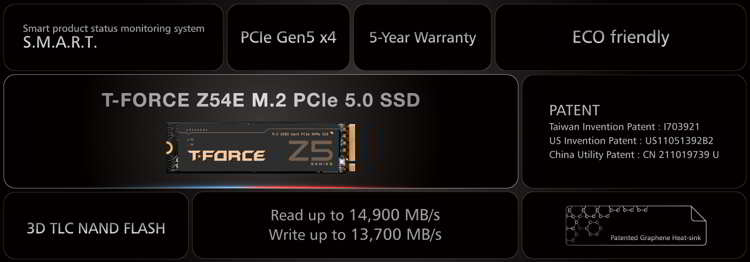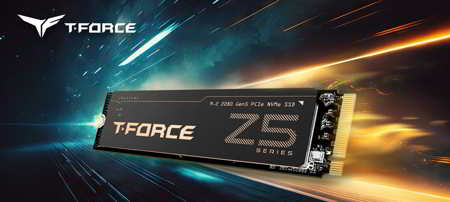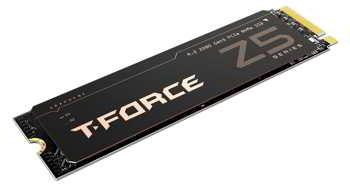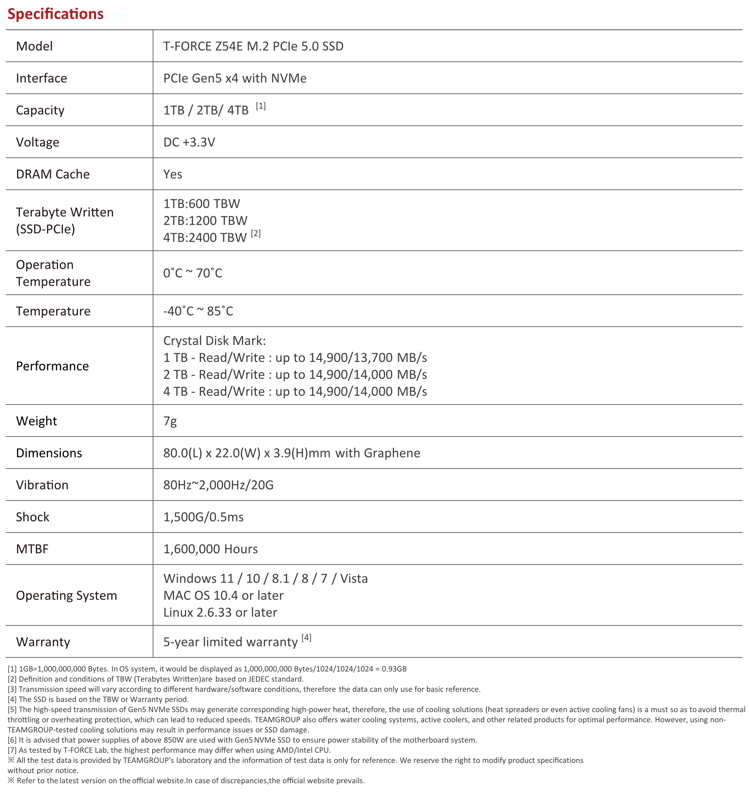Teamgroup Unveils T-Force Z54E PCIe 5.0 NVMe 2.0 Up to 4TB M.2 2280 SSD
Up to 14,900MB/s and up to 14,000MB/s RW speeds
This is a Press Release edited by StorageNewsletter.com on October 28, 2025 at 2:01 pmT-Force, the gaming brand of global memory Team Group Inc., introduced the next-gen of high-performance storage – the T-Force Z54E PCIe 5.0 SSD.
Powered by the Phison E28 controller built on TSMC’s advanced 6nm process, the drive pushes read speeds of up to 14,900MB/s. It adopts the latest PCIe Gen5 x4 interface and supports NVMe 2.0 protocol and integrates on-board DRAM cache to boost write performance. The Z54E features the company‘s exclusive patented ultra-thin graphene heatsink (1). Users can pair the SSD with the motherboard’s native heatsink or with the firm‘s optional SSD liquid cooler or active cooling solutions to build an optimal thermal configuration. This ensures sustained stability under extreme speeds, delivering an unprecedented gaming experience.
The T-Force Z54E PCIe 5.0 SSD is available in capacities of 1, 2, and 4TB (2), with the 2 and 4TB models delivering sequential read speeds of up to 14,900MB/s and write speeds of up to 14,000MB/s. Built with high-density 3D TLC NAND flash, it integrates advanced data protection and error correction technologies to ensure reliability and top-tier performance. Furthermore, the SSD delivers ultra-low latency and stutter-free gaming experiences. Teamgroup‘s patented S.M.A.R.T. monitoring software (3) enables users to track the SSD’s health and performance in real-time.
 True to its commitment to sustainability, the company‘s manufacturing processes adhere to RoHS environmental standards, in a halogen-free and lead-free environment and use fully recyclable packaging. While showcasing cutting-edge speed and innovation, the company also reinforces its long-term pledge to environmental protection.
True to its commitment to sustainability, the company‘s manufacturing processes adhere to RoHS environmental standards, in a halogen-free and lead-free environment and use fully recyclable packaging. While showcasing cutting-edge speed and innovation, the company also reinforces its long-term pledge to environmental protection.
(1) US Patent (Certification No. US11051392B2); Taiwan Patent (Certification No. I703921); Chinese Utility Model Patent (CN 211019739 U)
(2) 1 GB = 1,000,000,000 bytes; 1 TB = 1,000,000,000,000 bytes. A portion of the total capacity is reserved for formatting and system functions; therefore, the usable capacity could be less than the stated value. Reported capacity may also differ depending on the operating system’s method of unit calculation.
(3) Taiwan Invention Patent (Certification No. I751753)












 Subscribe to our free daily newsletter
Subscribe to our free daily newsletter

